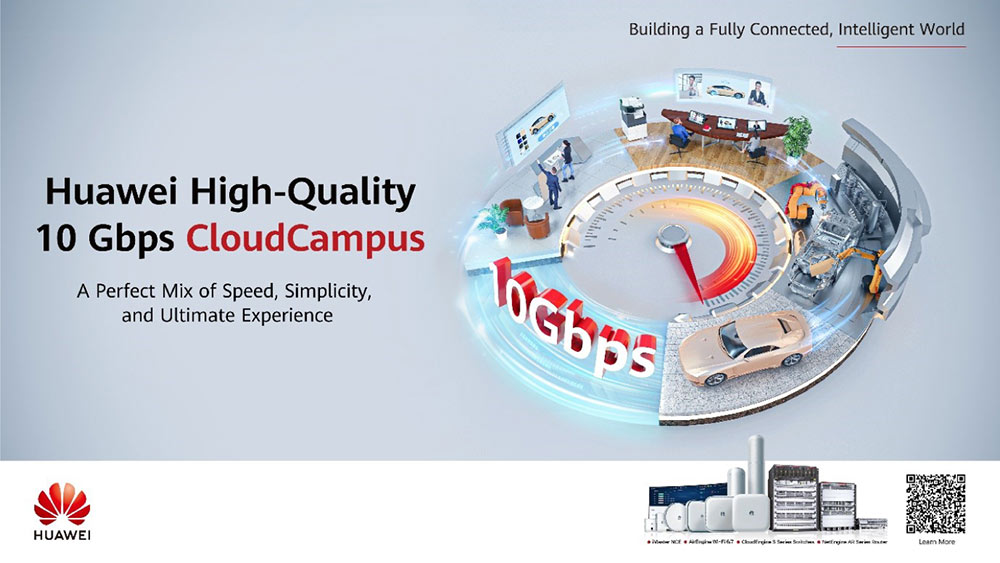Produkte, Lösungen und Services für Unternehmen
Smartphones, PCs & Tablets, Wearables, mobiles Breitband und mehr
Über Huawei, Nachrichten, Veranstaltungen, Brancheneinblicke und mehr
Interview with Liu Jianning, Vice President of Huawei's Data Communication Marketing & Solutions Sales Dept

Where a 1 Gbps corporate network was once the gold standard, the dominance of real-time video now demands higher bandwidth. 10 Gbps solutions are now emerging to provide super-responsive connectivity, right across campuses. Liu Jianning, Vice President of Huawei’s Data Communication Marketing & Solutions Sales Dept, discusses the need for 10 Gbps in business networks with CIO.
Huawei emphasises a “high-quality” 10 Gbps campus network. Can you elaborate on Huawei’s definition of “high quality” and how it differentiates from other solutions in the market?
We believe high quality involves three aspects.
First, good wireless office experience.
As digital transformation accelerates, mobile office anytime, anywhere becomes the new norm. Smart devices such as laptops, tablets, and videoconferencing endpoints will all be connected through Wi-Fi.
In the next two years, we will see a surge in smart terminals inside campuses. To support this, wireless networks must offer ultra-broadband access.
Huawei’s APs can meet this need due to our dynamic-zoom smart antenna technology, which can achieve 30% greater coverage range than the industry average.
Secondly, excellent audio and video experience.
Currently, audio and video traffic is growing over 30% year on year, so it’s a big challenge to ensure audio and video experience.
For example, in a video conference, the CEO may experience video that breaks up, frozen videos, or audio lag. If this happens, it may lead the CEO to question whether IT budgets are being invested properly. That’s why campus networks urgently need to ensure smooth HD video conferences in real time – it demonstrates that the IT team fully understands their network and has optimised the performance of it.
To cater to this demand, Huawei proposed an audio and video assurance solution. This industry-leading solution identifies mainstream audio and video applications, and preferentially prioritises audio and video services, avoiding re-transmissions when network congestion is encountered. The result is high definition video conferences that are always smooth in real time.
Thirdly, intelligent and efficient network O&M and assurance.
In today’s campus networks, IoT endpoints, APs, and switches are growing from thousands to tens of thousands. This increases the scale of device management complexity. As such, network O&M urgently needs navigation map-like functions to achieve automatic traffic steering, real-time monitoring, and fast fault locating and rectification.
Huawei delivers this through iMaster NCE-Campus’ digital map function, enabling one-map visibility into network, terminal, and application experience. It can also play back the entire user journey, automatically identify faults, and quickly troubleshoot in minutes.
With the rise of video conferencing and VR office services, there’s a significant demand for increased bandwidth and reduced latency. How does Huawei’s High-Quality 10 Gbps CloudCampus Solution specifically address these needs, especially in high-density scenarios like digital classrooms and stadiums?
In today’s office campus scenarios, audio and video traffic accounts for 80% of the total. To support this, we need to increase the access bandwidth from 2 Mbps to 100 Mbps while reducing the latency from 200 ms to 20 ms.
Especially in high-density environments, the terminals per access point (AP) are increasing from 30 to 60 or even 100. This is intensifying bandwidth contention among users and degrading service experience.
Huawei’s High-Quality 10 Gbps CloudCampus Solution introduces an ultra-broadband network architecture with “10 Gbps access, 100 Gbps core”. Here, “10 Gbps access” means we use wireless technologies to provide wired-like access quality. Huawei achieved this by launching the industry’s first enterprise-class Wi-Fi 7 AP, with a record-high peak rate of 18.67 Gbps. This AP delivers a single user’s demand for over 10 Gbps bandwidth.
Furthermore, Huawei’s iMaster NCE-Campus can classify and flexibly schedule user and service traffic. It ensures each user can obtain the most appropriate bandwidth assurance, preventing bandwidth contention among high-density users.
The Wi-Fi 7 era promises bandwidths exceeding 10 Gbps. How has Huawei leveraged this advancement, and what specific Huawei technical innovations have been incorporated into the CloudCampus Solution?
In 2023, we entered the Wi-Fi 7 era. Wi-Fi bandwidth has exceeded 10 Gbps, enabling campus network upgrade to 10 Gbps. Huawei’s High-Quality 10 Gbps CloudCampus Solution facilitates such upgrade through four unique features:
First, ultra-high-speed access.
10 Gbps to desktop and 10 Gbps to AP are must-haves for a campus with tens of thousands of users. This not only meets high-bandwidth service needs, but also greatly improves enterprise office and production efficiency.
Huawei’s Wi-Fi 7 AP uses dynamic-zoom smart antennas which can flexibly switch between omnidirectional coverage and high-density coverage modes. This improves network performance by 30% in high-density coverage scenarios, and is one generation ahead of other vendors. It’s an ideal choice for today’s fully wireless era and the coming surge in wireless terminals accessing the network.
Secondly, simplified architecture.
Campus networks must take on new features, such as multi-network integration, one network for all services, and green & low-carbon design. Huawei’s exclusive IP + POL solution meets this with a simplified two-layer architecture that requires less space and less cabling. Huawei’s hybrid cables enable PoE at an ultra-long distance of 2,000 m resolving the problem of difficult cabling and power supply to devices.
Thirdly, ultimate experience.
Campus networks need to ensure smooth HD video conferencing experience for users, especially VIP users, even where there is network congestion. In this way, VIP users can enjoy smooth network experience anytime, anywhere, on any terminal, and in any application.
Huawei developed an audio and video experience assurance card used on the core switch CloudEngine S8700. This card ensures optimal video experience for 10,000 users inside a campus.
Fourth, simplified O&M.
Huawei’s intelligent analysis platform automatically configures and manages network services, predicts network faults, and locates and rectifies faults in minutes.
As industries such as the public service, finance and healthcare continue to evolve, how does Huawei plan to adapt its CloudCampus Solution to meet changing demands and continue to deliver a frictionless user experience?
Huawei’s High-Quality 10 Gbps CloudCampus Solution is extremely valuable for large and midsize campus scenarios across a wide range of industries, including public service, finance, education, manufacturing, airport, energy, and healthcare.
In a higher education context, high-density scenarios like digital classrooms, stadiums, and lecture halls are seeing connected device density per AP growing two to three times. We also have other scenarios like AR/VR-based research and innovation, simulation software development environment in research labs, and remote cloud desktops. All these scenarios urgently require high-bandwidth 10 Gbps access. One-stop video conference assurance is needed during online classes and lectures.
Huawei’s High-Quality 10 Gbps CloudCampus Solution best suits these needs. It enables 10 Gbps to AP and 10 Gbps to classroom. This meets ultra-broadband demands in high-density environments such as lecture halls and stadiums.
Huawei’s unique audio and video assurance solution creates an ideal experience during online classes. In this solution, one device ensures smooth HD video teaching for 10,000 users. Another highlight is Huawei’s innovative digital map function. This function enables one-map visibility into terminals and network applications, greatly improving O&M efficiency.
With Huawei’s solution, Macau University of Science and Technology converged their office network, education network, and IoT network for unified O&M. This reduced TCO by more than 30%.
Similarly, Srinakharinwirot University (SWU) in Thailand benefited significantly from Huawei’s innovative digital map function. This function can play back the user journey from three dimensions – device, terminal, and application. It shortened the fault detection time from 2 hours to less than 1 minute.
Another great example was a bank in Europe Huawei assisted. Every month, the bank holds an average of 9000 video conferences, including 400 executive conferences. The IT department receives nearly 20 complaints from executives about video conference quality. Particularly in an important CEO speech, video conference interruptions occurred five times. IT engineers located the problem onsite more than three times but failed to find the root cause. To resolve this, the bank deployed Huawei’s audio and video assurance solution. Since then, the bank’s IT department has received no complaints from executives, and the bank’s CIO is extremely satisfied with the outcome.
Huawei’s CloudCampus solution is designed from the ground to bring scalable flexibility; and it does so by continuously evolving to meet this growth as network traffic and the number of connected devices continue to grow.
Find out how Huawei’s High-Quality 10 Gbps CloudCampus Solution can help your business achieve greater productivity here.

Mr. Liu Jianning is currently Vice President of Huawei’s Data Communication Marketing & Solutions Sales Dept. He is responsible for the global marketing and sales of Huawei’s enterprise data communication products and solutions.
Mr. Liu has nearly 20 years of experience in market expansion, solution sales, and marketing in the enterprise data communication domain. Prior to the current position, he served as Director of the Enterprise Solution Sales Dept of Huawei’s Middle East Region and Director of the Enterprise Business Marketing & Solution Dept of Huawei’s Guangzhou Rep. Office.
Disclaimer: The views and opinions expressed in this article are those of the author and do not necessarily reflect the official policy, position, products, and technologies of Huawei Technologies Co., Ltd. If you need to learn more about the products and technologies of Huawei Technologies Co., Ltd., please visit our website at e.huawei.com or contact us.